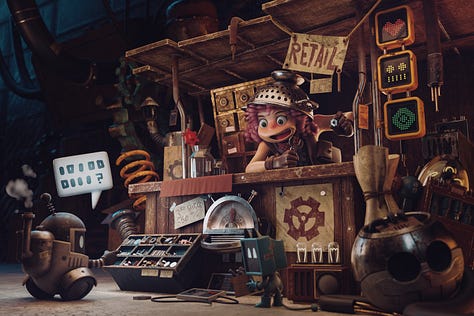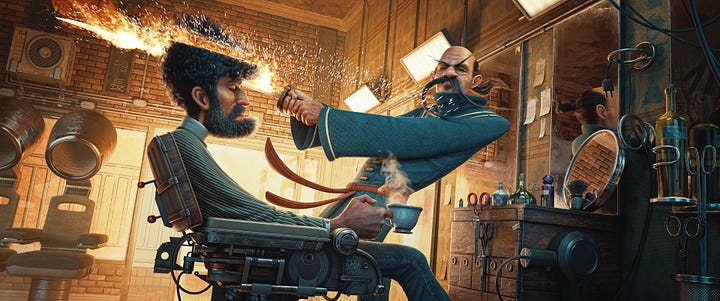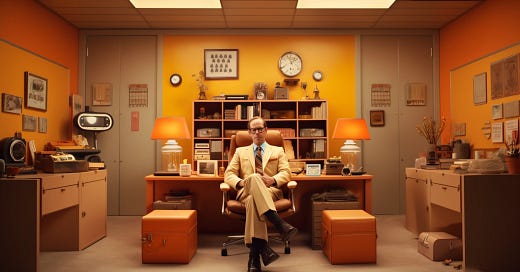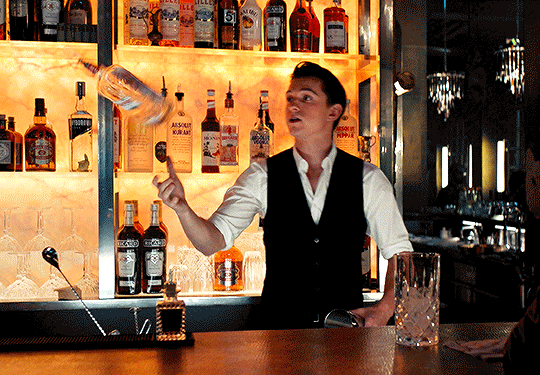Let me simplify this article for those in a rush. If you find yourself in the unfortunate predicament of working in a company with a toxic culture or under poor leadership, you have only one viable option:
Leave.
That's it. That’s is what you do 100% of the time this happens. You have to get out of that situation as swiftly as possible.
Thank you for attending my TED talk.
Why Am I So Confident in this Advice?
Throughout my 26-year career, I've encountered some truly dreadful jobs and even worse bosses. During my high school days, I had a brief stint as a clown, and my boss at the time purchased the cheapest makeup available, leaving my face stained a deep red around the mouth. I lasted a mere day in that position and earned a sum of $18, while the crimson mark remained with me far longer than the money.

At the age of 18, I held the position of assistant manager at Johnny Rockets in Columbus, Ohio. This was a big deal for me. $10/hour babbbyyyyy!!!!
There I had a truly awful general manager. He attempted to frame me for embezzling over a thousand dollars from the nightly deposit. He pocketed the money and forged my signature on all the relevant documents, attempting to shift the blame onto me.
Fortunately, his criminal activities were on par with his leadership skills, and he forgot I was able to prove I was in another state at the time. But either way, I left.
These types of things happened time and time again and in all my years of working, one consistent pattern emerged:
Bad bosses never improved.
They never saw the light or made any efforts to enhance their own performance. They were never whipped into shape by those above them and had their redemption moment.
Of course, I pretend I learned all this sometime in the 90s. I did not. Learning this valuable lesson took considerable time and, unfortunately, didn’t truly sink in until I after I started my career in 3D.
My Bad Boss in 3D
Quitting previous jobs before embarking on my 3D career was relatively straightforward. Those positions served as a way to make money to pay bills and I never envisioned them as long-term career prospects. I never felt a passion for the work and had no aspirations of franchising my own Johnny Rockets or being promoted to "Executive Clown" or whatever clowns get promoted to.
Everything changed when I entered the field of 3D. I genuinely loved my job. The projects were captivating, and the camaraderie with my colleagues was even more rewarding. It was an absolute dream come true and I knew definitively that I wanted this to be my career.
Then the bad boss arrived. For the sake of anonymity, let's give this boss a fake name. I’ll refer to the film Horrible Bosses and I’ll go with the character played by Kevin Spacey. I forget the character’s name so we will stick with Kevin Spacey as the alias.
Now, Kevin Spacey wasn't an overtly terrible boss. He didn't engage in frequent outbursts or force us to work uncompensated overtime. He wasn't incompetent either. I actually found him to be really intelligent and an extremely efficient artist when on the box. Yet, Kevin Spacey’s management style was unlike anything I had encountered before. If he took a disliking to someone, he ignored them. Like completely ghosted them. And as you might guess, I was one of those people.
Emails sent directly to him were left unanswered. If we happened to share an elevator ride, his gaze remained fixed on his phone and he pretended not to hear the “hello.” When it came time for the annual performance reviews, they didn't happen.
Initially, I placed the blame on myself. Did I underperform in my role? Was I unintentionally offensive? I believed it must have been something I had done wrong. Wanting to avoid further trouble, I kept my head down and tried to avoid making the problem worse.
However, one day, while working on a project, I accidentally accomplished something. I won't delve into the specifics, but I devised a clever solution to a problem that numerous artists on the project had been struggling with. Scraping together all my paltry scripting skills, I developed a small gizmo in the compositing software Nuke that automatically resolved the issue. I showed it to my sequence lead, who agreed this was a useful tool and suggested sharing it with the entire team.
I did so, and the praise poured in. I felt an immense sense of pride and a feeling of accomplishment I hadn’t felt in a while. I was riding high when my desk phone rang from Kevin Spacey's office asking if I could come by.
I entered optimistically. Maybe this bit of good work would shake off his icy exterior and we could begin to establish a normal relationship. But that’s not how Kevin Spacey rolled.
He informed me that it was not my responsibility to develop tools. My role was solely focused on working artistically on the shots, not concerning myself with workflow enhancements. It took me a moment but I realized I was being reprimanded for overstepping boundaries and told I needed to stay in my lane.
I returned to my desk chastising myself for sticking my neck out, I resolved never to repeat that mistake again. Regrettably, I didn't leave the company soon after the incident. I genuinely enjoyed the projects, cherished my colleagues, and couldn't shake the nagging thought that perhaps I really was the problem and was just fortunate to have a job. Consequently, I lingered far longer than I should have, so my career stagnated for a few years.
Why Is It Essential to Address This Issue?
Your boss's impact on your mental health cannot be underestimated. According to a study in a Forbes article, 69% of individuals claim that their managers have the most substantial influence on their mental well-being, comparable to the impact of their significant others
But can’t you wait until the boss leaves or gets fired or transferred or something? Do you really need to uproot your career just for a bad boss?
Again…if you want your career to keep growing. Yes.
I guess there could be a situation where someone is given a leadership role, fails, and then the company leaders decide to replace them.
Fine. I’ve just never seen that happen.
Because the problem isn't solely the bad boss. The problem is a company's culture that enables unqualified individuals to reach leadership positions and remain in charge despite their poor performance. How were there no repercussions for not Kevin Spacey not conducting performance reviews for years? How was there no anonymous way to provide upward feedback to a boss in a safe and honest way? Did they not know? Or did they not care since we kept delivering the films on time?
In hindsight, it didn't matter. Whether it was intentional or due to incompetence, the structure allowed this situation to persist. It's a systemic problem deeply ingrained in the company's foundation, making it almost impossible to uproot without a massive change that in a best-case scenario takes many years.
The Power of the Good Boss
The other, more compelling reason is that we all deserve a good boss. The power of a good boss cannot be understated. While bad leadership can significantly hinder your career, good leadership is a turbo boost. A good boss will position you to leverage your strengths, identify areas for improvement, and provide support and encouragement for growth.
In grad school, I worked in a bar in downtown Savannah called Churchill’s Pub. My bosses there were Andy and Tracy Holmes (sorry Jennifer Aniston and Colin Firth…for praise, I give real names). They ran an incredibly tight ship and I learned much about running a business from them.
The biggest was the importance of attention to detail and how it can allow you to eliminate problems quickly. Andy was teased by all the bartenders for going around every morning with a sharpie and marking each liquor bottle and checking the previous night’s orders to ensure nothing was poured without being accounted for.
But this attention to detail ended up saving him thousands.
It turned out, he also put gauges on the kegs to measure how much beer was being poured. The bartenders didn’t know about those and Andy caught several “selling” hundreds of beers each night and pocketing the money themselves. There was even one night were the count was off by over 200 pints!
He fired those that stole from him and gave the honest remaining bartenders all their prime shifts. As one of those bartenders, this rewarded my good behavior and punished those that didn’t follow the rules. Also a key to good leadership.
(Side note…He also “caught” me selling one more beer than I poured one night. I was not the best bartender but he liked that.)
In my time at Blue Sky, I was fortunate to have a kind, patient first boss in Mike Kingsley. I had incredible artistic leadership from people like Haji Uesato and Jim Gettinger that helped me grow as an artist. Individuals like Jackie Jones, Roberto Calvo, Julie Zachary, and Andrew Millstein challenged me to take on new responsibilities and nurtured me through my first leadership position.
I’ve been extremely fortunate in my current role on the Substance 3D team at Adobe as well. Sebastian DeGuy is a true visionary in the world of 3D and Alexis Khouri is the compassionate, knowledgable, and direct boss every should have at least once in their careers.
Ok…now it’s starting to sound like I’m accepting an award, but I wanted to take a chance to call out the good leaders who have helped me throughout my career. I would not have been able to grow and get to the place I’m at now without each of them and more. Plus, it’s my newsletter so I do what I want!
So don’t let bad leaders stymie your career. There are great bosses out there and you deserve to work with people that allow you to reach your full potential.
And speaking of doing whatever I want in my newsletter…here’s another weird leg, bad boss, Midjourney image. Why does this AI think that being a bad boss means your legs function independently of your body!?!?!?
3D News of the Week
A roundup of interesting 3D related news you may have missed this week.
Epic Games launches MetaHuman Animator to capture high-quality human faces with an iPhone - venturebeat.com
Virtually try on clothes with a new AI shopping feature - blog.google
How the art direction in The Legend of Zelda has evolved over 30 years - videogamer.com
Ikea Shows Off An AR-Enabled 19-Foot Shopping Bag - mediapost.com
Learning about Mechanism of Action & Mechanism of Disease is Easier Than Ever With 3D Medical Simulation - tippingpointmedia.com
Artist of the Week





3D Tutorials
3D Job Spreadsheet
Link to Google Doc With A TON of Jobs in Animation (not operated by me)
Michael Tanzillo is the Head of Technical Artists with the Substance 3D Growth team at Adobe. Previously, I was a Senior Artist on animated films at Blue Sky Studios/Disney with credits including three Ice Age movies, two Rios, Peanuts, Ferdinand, Spies in Disguise, and Epic.
In addition to his work as an artist, Michael is the Co-Author of the book Lighting for Animation: The Visual Art of Storytelling and the Co-Founder of The Academy of Animated Art, an online school that has helped hundreds of artists around the world begin careers in Animation, Visual Effects, and Digital Imaging.
www.michaeltanzillo.com
Free 3D Tutorials on the Michael Tanzillo YouTube Channel
Thanks for reading The 3D Artist! Subscribe for free to receive new posts and support my work. All views and opinions are my own!









